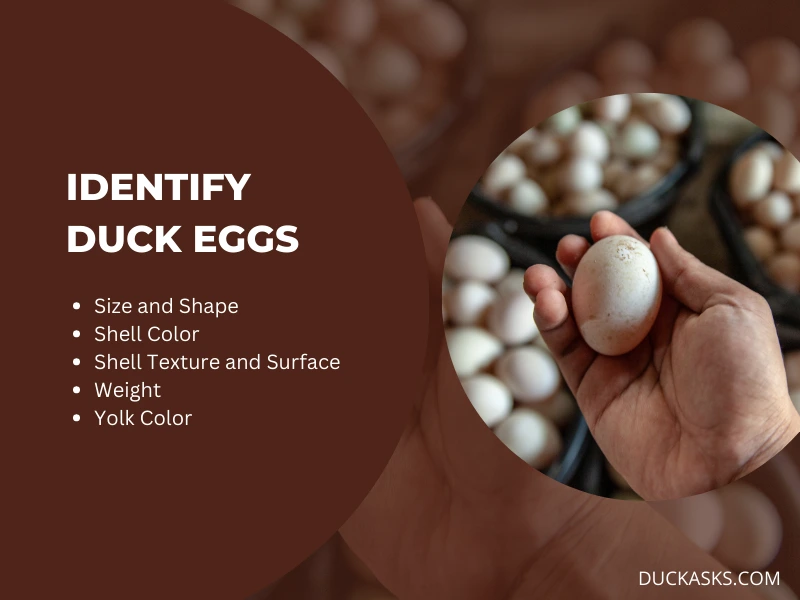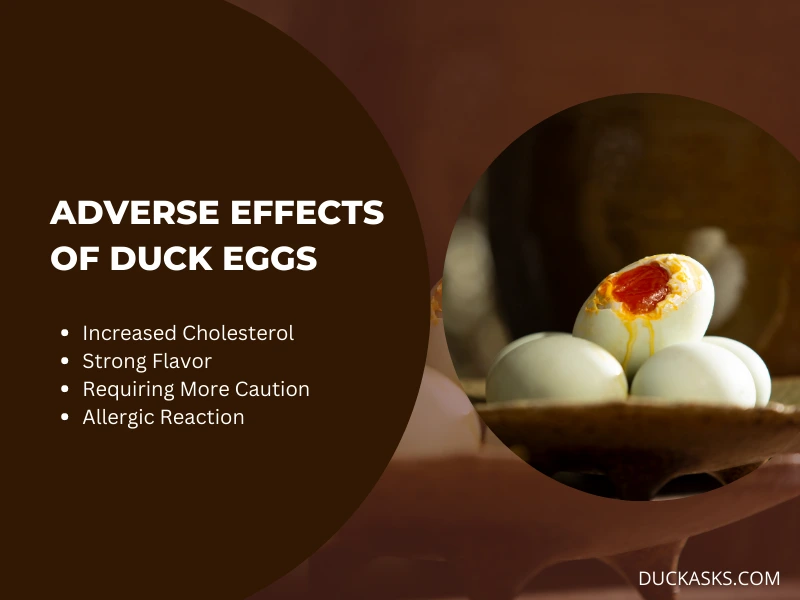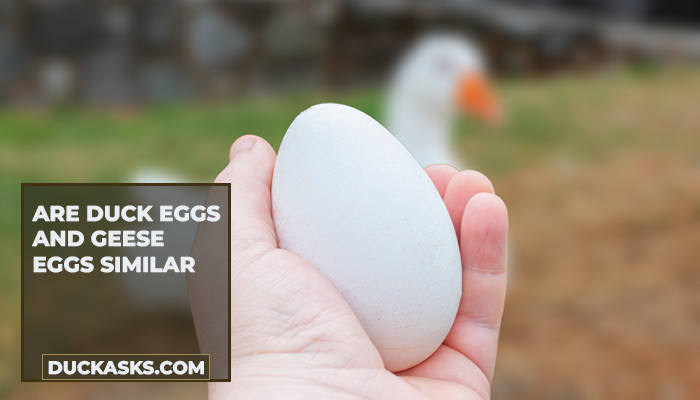What Do Duck Eggs Look Like?
Duck eggs are slowly taking over Western cuisines due to their creamier texture, richer flavor, and better nutritional value. But what do duck eggs look like? Are there any noticeable peculiarities?
Compared to chicken eggs, duck eggs generally have 1.5 to 2 times larger shells and are slightly elongated in shape. Commonly duck eggs have white shells.
However, there can be variations in shape and color depending on the breed of ducks. Also, the yolk of a duck egg will appear more vibrant than a chicken egg.
Identifying duck eggs will be a must-know if you are foraging for wild eggs or raising ducks on a farm.
Looking for more articles about ducks breeding:
How Do You Identify Duck Eggs?
Duck eggs have some distinct traits that can help you identify them easily. Let’s see what they are.

Size and Shape
Typically, duck eggs are 50 to 100% larger in volume than chicken eggs. The size and shape vary between breeds, but they generally appear elongated and with a more prominent, rounded end.
Shell Color
Duck eggshells come in various colors but mostly in white. Other noticeable colors in duck eggshells are pale blue, light green or gray, and sometimes even black.
Besides breed and genetics, the color of the shell can vary based on factors like ducks’ diet, habitat, temperature, atmosphere etc.
Shell Texture and Surface
Compared to average chicken eggs, duck eggs have thicker and tougher shells and shell membranes. This allows the eggs to remain fresh for a longer period.
Weight
The weight of a duck egg can be a distinguishing feature for its identification. Pee-wee or pullet eggs, laid by young hens, are the smallest egg size, and they weigh around 1.10 to 1.20 ounces each.
And a medium-sized chicken egg weighs around 1.70 ounces. Compared to these, duck eggs are way heavier, weighing 3.2 – 3.3 ounces per egg. Some duck eggs can even be 4 ounces per egg.
Yolk Color
Duck egg yolks definitely have a deeper and more vibrant shade of color compared to chicken. Unlike being yellow or pale yellow like chicken eggs, duck eggs are more reddish or orangey with a richer appearance.
Are There Any Distinguishing Features or Markings on Duck Eggs?
Unfortunately, other than the elongated shape and larger size, duck eggs mostly don’t have any specific markings for distinguishing. If the egg is white and 1.5 to 2 times larger in size than chicken eggs, it’s most likely from a duck.

Also, unusual colorings on the egg, like shades of blue, green, or black, will definitely help. Sometimes duck eggs appear with small, speckled patterns on their shells.
These speckles can range in color from light brown to dark specks on lighter-colored shells. But they’re mostly the result of the duck’s diet and growing environment and don’t necessarily indicate that it’s a duck egg.
Can You Eat Duck Eggs?
Yes, not only duck eggs are edible, but they also contain more flavor and nutrients compared to chicken eggs. They are rich in useful vitamins like B12, A, and D, alongside healthy Omega-3 fatty acids.
Duck eggs are widely appreciated and used in many Asian and some European cuisines, [1] but only recently they’re rapidly making their way into the West.

And duck eggs offer a unique taste and texture compared to chicken eggs. They have a richer and creamier flavor, and their yolks are notably larger with a higher fat content, contributing to their velvety taste.
Some people even prefer duck eggs over chicken eggs for their distinct flavor profile.
Due to being rich in fat content and having firmer whites, duck eggs are more suitable for baking and making dessert items.
Bakers and pastry chefs love duck eggs as the rich proteins in the egg whites provide structure to the batter or dough, allowing it to trap more air and rise better.
Any general egg dish can be given a delightful twist with the unique flavor of a duck egg. Duck eggs also retain increased moisture, making dishes like omelets and quiches richer and fluffier.
A Few Adverse Effects of Duck Eggs
Although duck eggs are better in terms of taste and nutrients, there are points you should be aware of –

Increased Cholesterol
Compared to chicken eggs, duck eggs contain more cholesterol content. Excessive levels of cholesterol in the blood can be harmful and increase the risk of various health problems like heart disease and stroke.
Strong Flavor
As duck eggs contain richer texture and flavor, it also makes the dishes eggier. Some people might find the flavor overwhelming, especially if not managed right.
Requiring More Caution
Due to the high protein content in egg whites, duck eggs require precise cooking techniques. Overcooking the eggs will make them gummy or rubbery, which is really unpleasant to consume.
Allergic Reaction
Duck eggs can cause strong allergic reactions in some people. So, you should be very careful before eating your first duck egg-based dish.
Conclusion
Knowing what do duck eggs look like is just a matter of identifying a few traits. They are an exciting alternative to chicken eggs, offering unique flavors and textures that cater to diverse culinary preferences.
Eggs are one of the most popular and versatile cooking ingredients in the entire world and duck eggs add a lot to that fact. So, try one today, and we’re sure you’ll love it!
References:
- https://www.healthline.com/nutrition/duck-eggs-vs-chicken-eggs#basic-differences
- https://www.hgtv.com/outdoors/gardens/animals-and-wildlife/duck-eggs-411
Image Credit:
- Canva.com/photos






